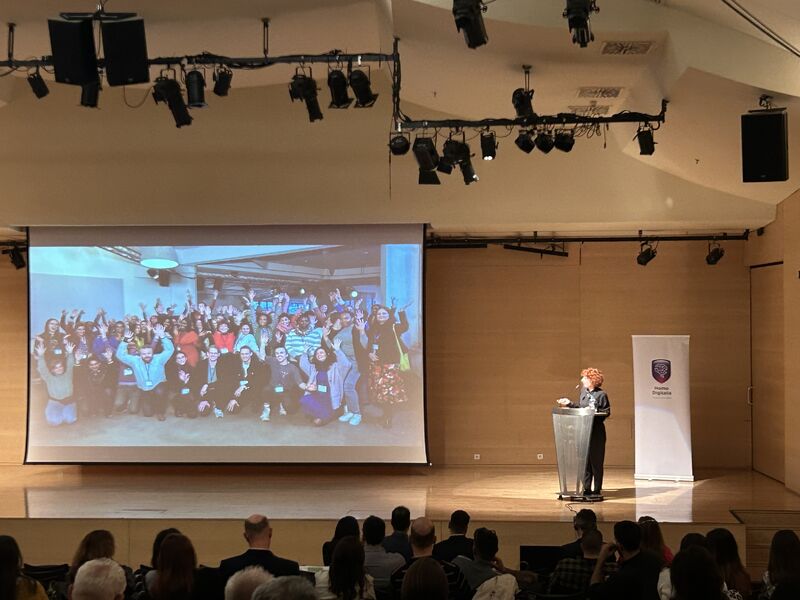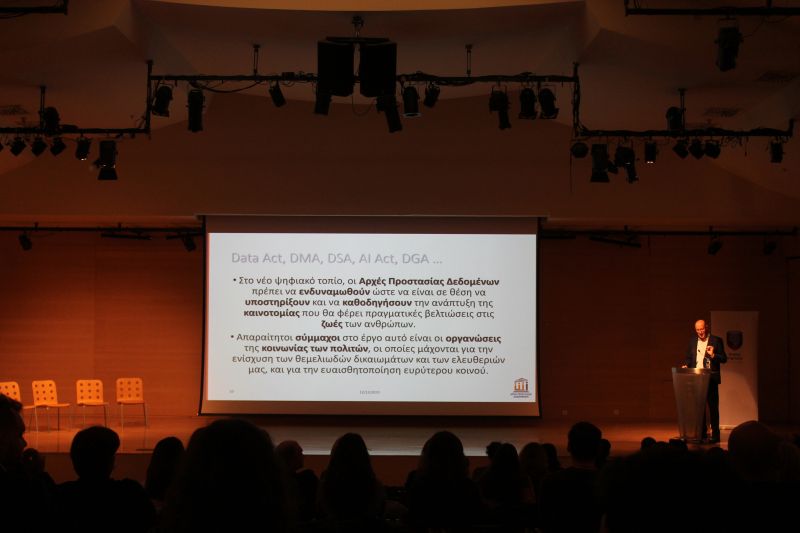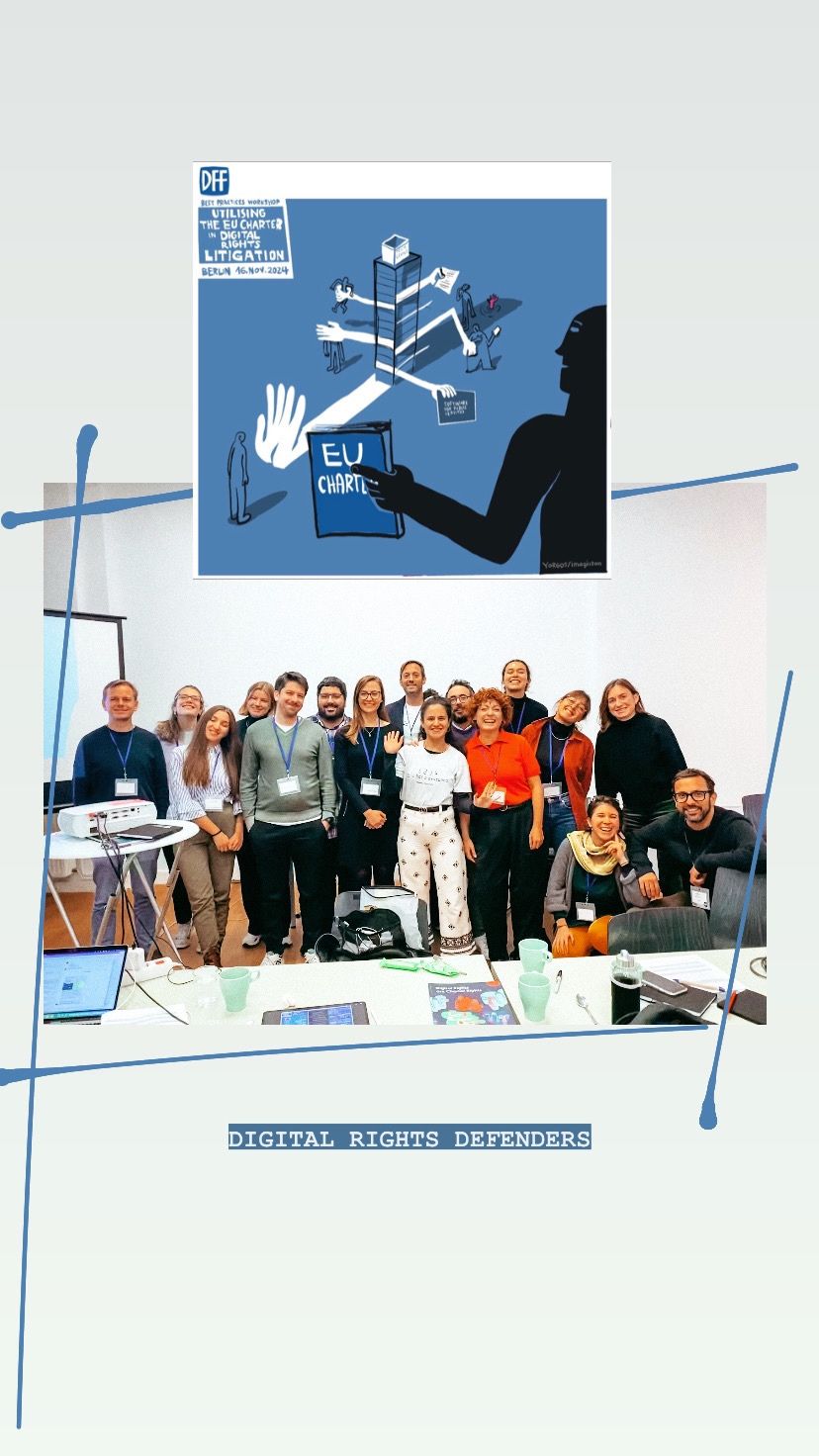Privacy Day is not a day of wishes, but a day of responsibility!
28 January is the international day dedicated to the protection of personal data!
Since March 2018, and for almost 6 years now, Homo Digitalis has carried out important actions for the protection of personal data in all 3 pillars of its action, those of awareness-raising, policy-making and legal actions.
At our celebratory event last month, we spent about 2 hours talking about all our successes. For today, we prepared a short video of a few seconds to present some highlights of these successes. Because today is not a day of wishes, but a day of responsibility! You can watch our short video https://www.linkedin.com/feed/update/urn:li:activity:7157389006190608384here.
Insights from our Celebration event: Digital Freedom Fund and University of Amsterdam Speech
At our celebration of 5 years of Homo Digitalis & 20 years of European Digital Rights (EDRi) at The Benaki Museum, we were honoured to host a talk by Dr. Alexandra Giannopoulou, digiRISE Project Manager of the Digital Freedom Fund and Researcher at UvA-University of Amsterdam!
In her presentation, she informed the audience in detail about the DFF’s grant programs and its important educational activities under the “digiRISE: Digital Rights are Charter Rights workshops” program.
She also made extensive reference to the funding received in 2023 by Homo Digitalis to develop preparatory legal actions against national legislation providing for the retention of electronic communications metadata.
Finally, he underlined the important cooperation that exists between DFF and Homo Digitalis both with regard to the project “Decolonising the digital rights field” and in the context of the annual meetings of strategic legal actions.
In fact, this last meeting was successfully co-organized by DFF & Homo Digitalis in September 2023 in Athens! You can watch the video of the event in the following link here.
Insights from our Celebration event: European AI & Society Fund Speech
At our celebration event for 5 years of Homo Digitalis & 20 years of European Digital Rights (EDRi) at The Benaki Museum, we had the honour to host presentations from important foundations and organizations that have chosen to support our actions!
One of these is the European AI & Society Fund , which enables a diverse ecosystem of civil society organisations to shape policies around AI in the public interest, and mobilises the philanthropic sector across Europe to support this vital work.
The organisation’s Programme Director, Alexandra Toth, travelled to Athens and delivered an excellent talk on the challenges posed by AI applications for our democratic societies, the actions they support, the funding packages available, and of course the significant successes of EDRi & Homo Digitalis in this area.
We have immense gratitude to the European AI & Society Fund, as after 5 years of full-time volunteer activities, they gave us the opportunity in 2023 to hire the first full-time staff in our organization, the Director of Human Rights & AI, Lambrini Yftokosta Also, we would like to thank them for the funding under the Learning & Development program that made it possible to organize our workshop!You can learn more about the European Artificial Intelligence & Society Fund here.
Insights from our Celebration event: The Greek Data Protection Authority's Speech
In the first live talk of our 5 Years of Homo Digitalis & 20 Years of European Digital Rights celebration event a few weeks ago at The Benaki Museum, we had the great honor to host a presentation by Dr. George Rousopoulos, Computer Engineer, Specialist Scientist of the Hellenic Data Protection Authority (DPA)!
Mr. Rousopoulos spoke in detail about the importance of the active presence of civil society organizations in democratic states, made reference to the way in which the provisions of the GDPR have led to the significant improvement in the level of protection of our personal data, but also to the challenges that arise during its implementation, when supervisory authorities remain understaffed and with reduced financial resources.
Furthermore, he highlighted some of Homo Digitalis’ significant successes, such as the EUR 20 million fine against CLEARVIEW AI and the revision of the provisions of Law 4624/2019, while underlining the importance of cooperation between supervisory authorities and the CSOs.
“In the new digital landscape, Data Protection Authorities need to be empowered to be able to support and drive the development of innovation that will bring real improvements to people’s lives. Indispensable allies in this work are civil society organisations fighting to strengthen our fundamental rights and freedoms, and to raise awareness among the wider public.”
Insights from our Celebration event: European Data Protection Supervisor's Speech
On 12/12/23 we celebrated our birthday at The Benaki Museum together with European Digital Rights (EDRi) by looking back on the important actions & unique successes we have achieved through exclusive volunteer activities during our first 5 years of operation!
Our contribution to the protection of Human Rights in the modern digital age was discussed in person or online by supervisory authorities, institutions, academics, journalists and civil society organisations!
Among them, we were honoured by the European Data Protection Supervisor (EDPS) Dr. Wojciech Wiewiorowski , who accepted our kind invitation to deliver the opening speech of the event. EDPS spoke about the important contribution of Homo Digitalis and EDRi to the protection of personal data and privacy, the pivotal role of civil society organisations in defending democracy and the rule of law, and the need to cooperate with them.
We would like to thank EDPS and his office for the birthday greetings and the heartfelt speech. These words give us the strength to continue our work! You can enjoy a short excerpt of his speech or view the full EDPS positioning here.
We spoke at the Legal Seminar 2023 on EU Law and Undocumented Migrants in Brussels!
On 29 and 30 November, Homo Digitalis’ Director for Human Rights and AI, Lambrini Gyftokosta, spoke at the “Legal Seminar 2023 on EU Law and Undocumented Migrants” organized by the Platform for Undocumented Migrants (PICUM) and Equinox: Racial Justice Initiative at the Vrije Universiteit Brussel!
The two-day seminar examined the intersection of racial profiling, policing and immigration control. We presented three of Homo Digitalis’ actions in Greece on digital rights violations, which further blurred the boundaries between criminal and immigration law.
We were joined on the discussion panel by an amazing group of experts, namely Selma Benkhelifa (Progress Lawyers Network-Brussels), Sara Traylor (Alarm phone) and Laure Baudrihaye-Gérard (moderator, independent expert).
We would like to thank PICUM and Equinox for the invitation and for organising such an event exploring the pitfalls of the current EU legal framework on immigration. It was a great honour to participate!!! You can read more about the two-day event here.
Our celebration event for the 5 Years Homo Digitalis & 20 Years European Digital Rights at the Benaki Museum was a great success
Our celebratory event for the 5 Years of Homo Digitalis and the 20 Years of European Digital Rights at the Benaki Museum last week was an absolute success and was, without a doubt, one of the most intense, moving and important moments we have ever experienced!!
We managed to bring together in just a few hours the voluntary work we have all done together over these 5 years to make our digital society a little better!
While we are preparing posts with great material of photos, videos, and presentations coming soon we wanted to say today a HUGE thank you to our event volunteers, Ariana Rapti, Charalampos Kyritsis, Yannis Marinakis, Avgi Saoulidou, Nikoletta Georgakopoulou, Alexandra Giannopoulou, and Sophia Antonopoulou, without whom we would not have made it!
Thank you to all our members, all & all of you, for these five years, for the dedication and seriousness you have shown to the organization!
We invite you to the celebration of 5 Years of Homo Digitalis & 20 Years of EDRi
We invite you to celebrate our birthday together!
Come and experience what Homo Digitalis has achieved in 5 years – and European Digital Rights (EDRi) in 20 years – of action for the protection of Human Rights in the modern digital age.
The event is free of charge and will be followed by networking drinks
Registration required by 1/12 here.
We will celebrate together with key speakers who will honour us :
-Dr. Wojciech Wiewiorowski, EDPS – European Data Protection Supervisor
-Dr. George Rousopoulos, Computer Engineer, Specialist Scientist, DPO
-Alexandra Toth, Programme Manager, European AI & Society Fund & Society Fund,
-Dr. Alexandra Giannopoulou, digiRISE Project Manager of the Digital Freedom Fund and Researcher at the University of Amsterdam
-Eliza Triantafyllou, Journalist, inside story.,
-Diego Naranjo, Head of Policy, European Digital Rights (EDRi)
-Max Schrems, Honorary President noyb.eu
-Ioannis Kouvakas, Senior Legal Counsel & Assistant General Counsel, Privacy International
*The exact programme of the event will be published in the coming days.
We participated in the DFF's Berlin event on the use of the EU Charter of Fundamental Rights in our legal actions
Last week we participated in the workshop organised by DFF in Berlin focusing on the importance of using the EU Charter of Fundamental Rights in our legal actions!
DFF launched the digiRISE project to raise awareness of the potential of the EU Charter of Fundamental Rights in defending and protecting digital rights.
The workshop was attended by Privacy International, Access Now, Share Foundation and many other civil society organisations.
Homo Digitalis was represented by Elpida Vamvaka, President of the Board of Homo Digitalis.
Many congratulations to the DFF team for the organization!








